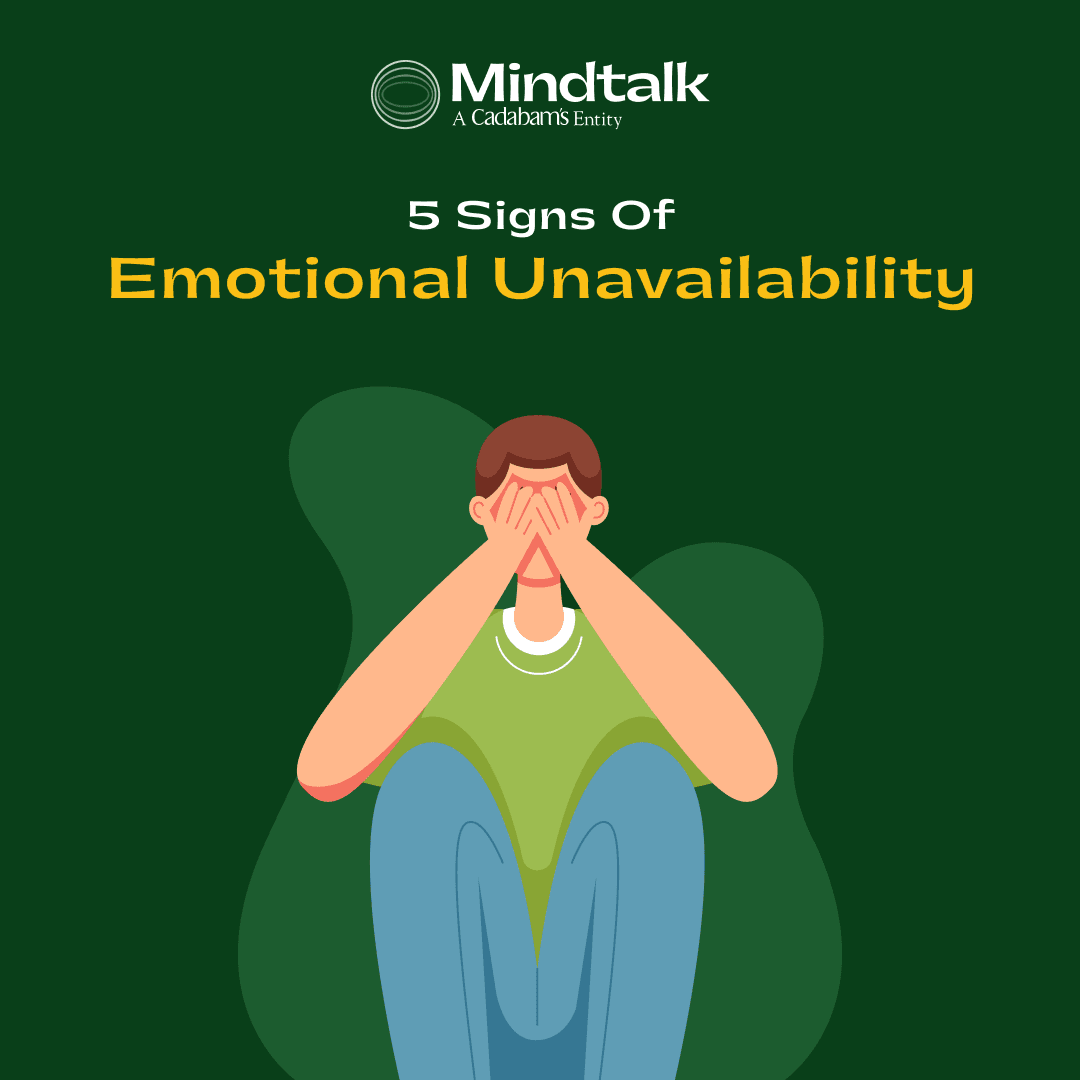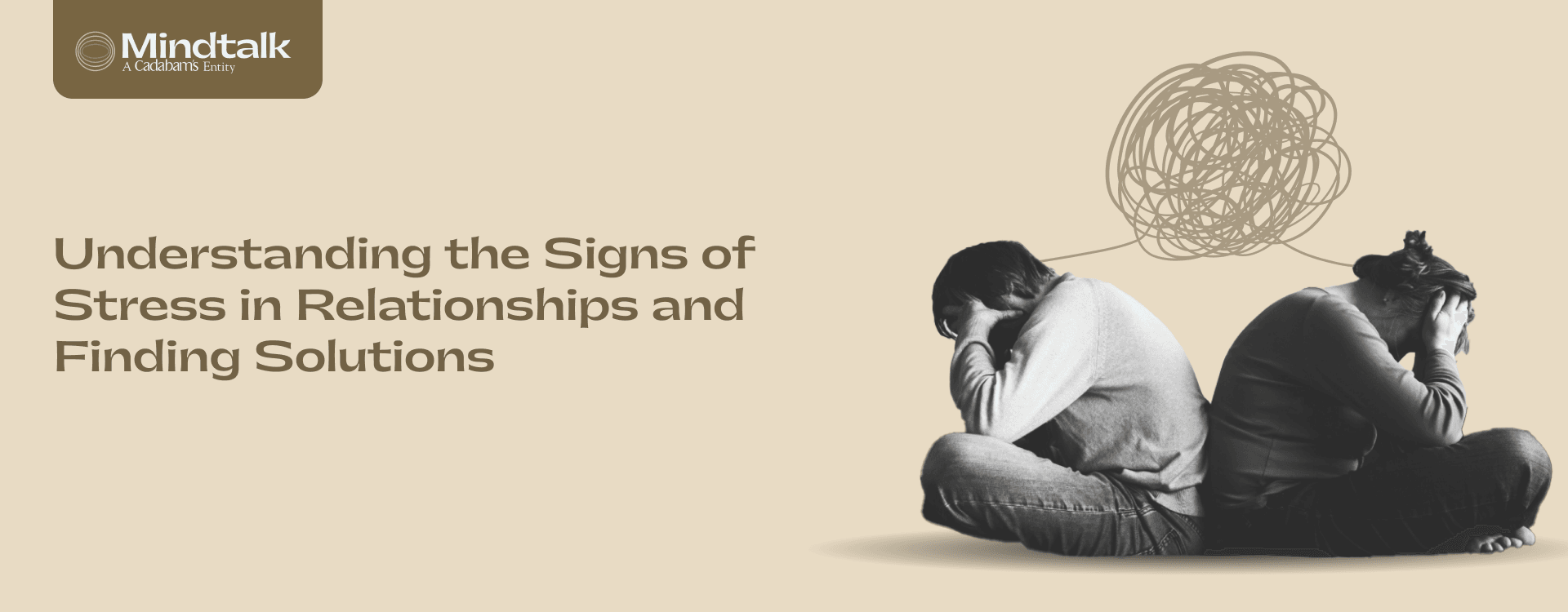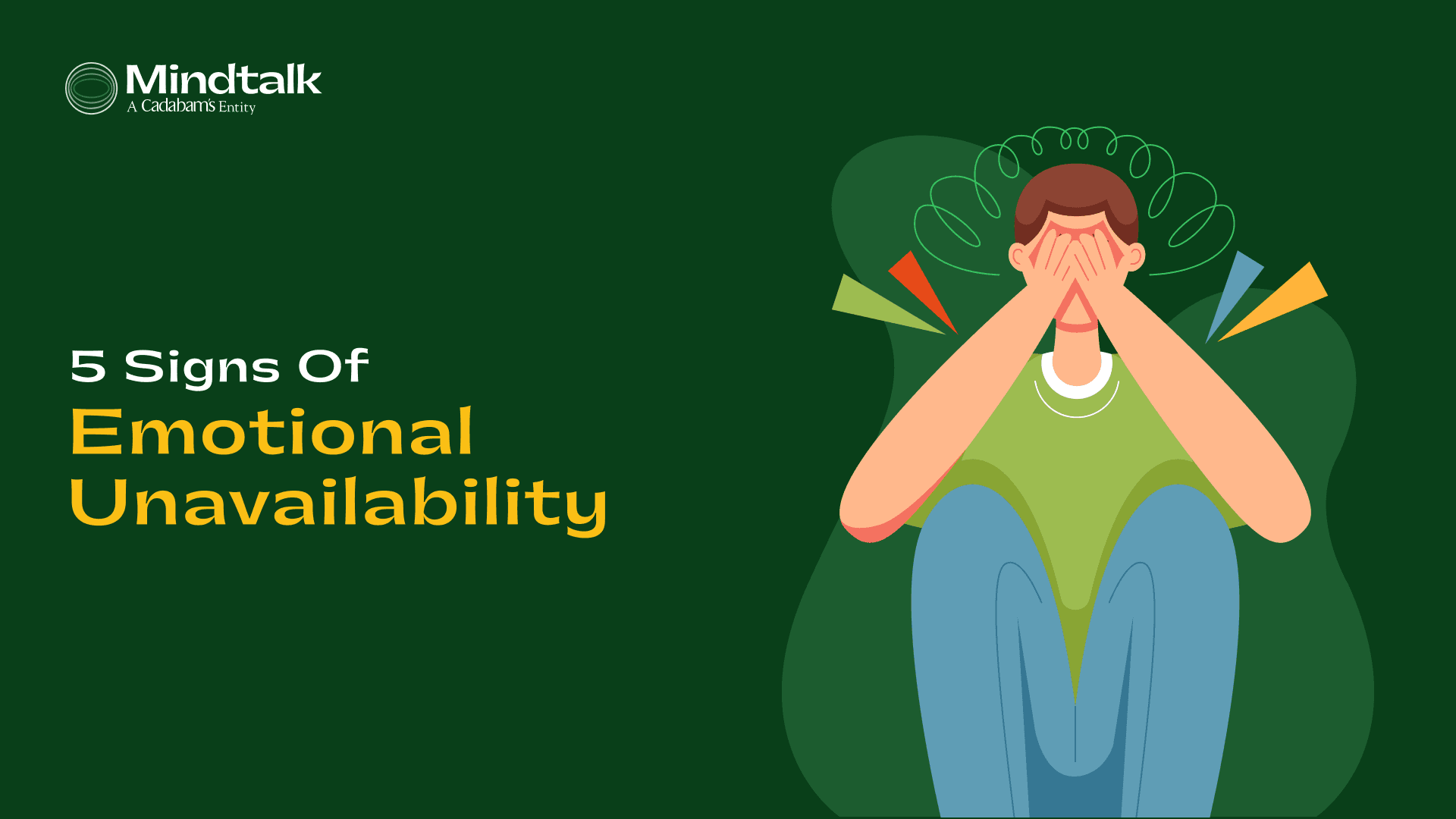Understanding Emotional Unavailability in Relationships
You open up, hoping to feel closer - only to be met with silence, detachment, or a change of subject. That ache? It could be emotional unavailability. In this blog, we’ll explore what it looks like, why it happens, and how to move toward healthier, more emotionally connected relationships, with clarity, compassion, and the courage to seek change.

What Is Emotional Unavailability?
Emotional unavailability refers to a person’s difficulty or unwillingness to form close emotional connections. This can lead to distance, miscommunication, or confusion in relationships. It’s not always intentional, but it often blocks intimacy, trust, and emotional growth.
What Is Emotional Availability?
Emotional availability refers to a person's ability to be open to forming emotional connections with others, showing a willingness to share feelings, be empathetic, and engage in deep interpersonal interactions. This concept encompasses various aspects of how individuals interact and connect with others on an emotional level.
Characteristics Of Emotional Unavailability
Emotionally unavailable individuals often display characteristics that make forming deep, meaningful relationships challenging. Here are some common traits and behaviours:
Avoidance of Emotional Intimacy: They may avoid situations or conversations that require sharing feelings, preferring to keep interactions superficial.
Difficulty with Commitment: Emotionally unavailable people often have trouble committing to relationships or projects requiring long-term emotional investment.
Limited Emotional Expression: They tend to keep their emotions to themselves and may appear stoic or indifferent, even in situations that would typically elicit a strong emotional response.
Reluctance to Discuss Feelings: When asked about their feelings, they might deflect, change the subject, or give vague responses instead of expressing themselves clearly.
Preferring Isolation: They may choose to spend time alone or disengage from social activities, especially those that involve close personal interaction.
Inconsistent Communication: Their communication can be sporadic—intense at times and distant at others- confusing for their partners or friends.
Signs of Emotional Unavailability
The following signs can help identify emotional unavailability in oneself or others:
When Obligations Loom, Individuals often Retreat: This avoidance happens because commitment necessitates closeness and vulnerability. It might show up in various ways, such as avoiding plans with a partner, postponing dates, or feeling uncomfortable with the idea of moving in together.
Keeping Options Open Rather than Commit to Someone: This behaviour often arises from a fear of being hurt if they become close to someone. It may involve dating multiple people concurrently, staying open to new possibilities, or avoiding relationships entirely.
A Fear of Deep Intimacy: This fear may stem from concerns about feeling rejected, abandoned, or controlled. In relationships, these individuals might appear distant, avoid physical intimacy, avoid discussing their feelings, or keep personal matters private.
Difficulty in Trusting Others: Emotional unavailability may also result from past relationships where individuals were hurt or betrayed, leaving them fearful of future betrayals.
A Tendency to Commit to Emotionally Distant People: Such individuals often feel more comfortable with others who display similar emotional unavailability. They may also believe that they do not deserve love from an emotionally healthy person.
These behaviours and patterns provide insight into emotional unavailability and its impact on relationships, guiding both individuals and partners in understanding these dynamics.
Signs that a Partner Might Be Emotionally Unavailable
Emotional unavailability can significantly impact relationships, often leaving partners feeling distanced or unfulfilled. Recognising the signs can help in addressing these issues constructively.
Difficulty Expressing Verbal Affection: For someone who is emotionally unavailable, saying things like "I love you" or openly showing appreciation can be challenging. However, they may express affection through actions rather than words, such as surprising their partner with a thoughtful gift or engaging in kind acts to convey their feelings indirectly.
Struggles with Open Emotional Expression: These individuals often find it difficult to recognise and articulate their own feelings, which can make sharing emotions with a partner challenging. This reluctance can lead to avoidance of discussing personal feelings or intimate thoughts.
Discomfort with Physical and Emotional Intimacy: Emotional unavailability often manifests as discomfort with intimacy. This might include avoiding physical touch, distancing themselves emotionally, or keeping personal matters private rather than sharing openly with a partner.
History of Toxic Relationships: Past experiences of abuse, neglect, or betrayal can contribute to a person’s emotional unavailability. Such experiences may reinforce an unwillingness to be vulnerable or open in new relationships.
Fear of Commitment: A reluctance to make long-term plans, such as marriage or moving in together, is another sign of emotional unavailability. They might postpone discussions about the future due to a fear of emotional attachment and commitment.
Tendency to Stay Busy or Unavailable: Those who are emotionally unavailable often maintain a pattern of busyness, distancing themselves from quality time with a partner. This may include distractions like work or hobbies, which serve as a way to avoid deeper emotional connection.
It’s important to remember that not all individuals displaying these characteristics are necessarily emotionally inaccessible. People may have various reasons for finding it difficult to express feelings or build connections. However, if multiple signs are present, it might be worthwhile to discuss these concerns openly with a partner. Identifying and understanding these signs can support healthier, more fulfilling relationships.
What Causes Emotional Unavailability?
Emotional unavailability can arise from various factors, often shaped by personal history and mental health challenges. Below are some common causes:
Abuse or Trauma in Childhood: Individuals who have experienced abuse or trauma in childhood often develop coping mechanisms, such as emotional suppression, to shield themselves from further pain. This habit of emotional distancing can persist into adulthood, making it difficult to connect with others.
Unhealthy Connections: Emotionally unavailable people may also have been in dysfunctional relationships, such as those marked by abuse, neglect, or betrayal. This could result from their learning that it is dangerous to be open and vulnerable with other people.
Mental Health Challenges: Conditions like anxiety, depression, and post-traumatic stress disorder (PTSD) can contribute to emotional unavailability. These issues can make it challenging for individuals to manage their emotions or engage in healthy emotional connections.
Personality Disorders: Emotional inaccessibility is also linked to some personality disorders, including borderline and avoidant personality disorders. These conditions can lead to avoidance of intimacy and difficulty in establishing close, trusting relationships.
Understanding these causes can provide insight into the complexities of emotional unavailability and help address them effectively.
How to Overcome Emotional Unavailability?
Overcoming emotional unavailability requires dedication and self-reflection, but progress is possible. By addressing underlying issues and adopting healthy coping strategies, individuals can foster more meaningful connections and relationships. Here are some practical steps to help move toward emotional availability and build deeper, more fulfilling connections:
Determine Your Triggers
Identify situations or interactions that make you feel nervous or uneasy. Once you've pinpointed these triggers, work on developing healthy coping mechanisms to handle them better. This self-awareness is the first step toward managing emotional responses.
Challenge Negative Thoughts
Emotionally unavailable individuals often harbour pessimistic views about themselves and their relationships. When negative thoughts arise, question their validity and seek evidence to counteract them. This process can help to reduce self-doubt and improve self-esteem.
Learn To Trust In Yourself
Emotionally unavailable individuals frequently struggle with self-trust, especially in decision-making. When faced with a decision, reflect on your own wants and needs and practice self-confidence in choosing what’s best for you. Trusting yourself is essential for healthy emotional openness.
Be Honest With Yourself And Others
Building trust and intimacy requires honesty. When you are truthful with both yourself and others, it creates a safe environment for vulnerability and emotional openness, strengthening your relationships.
Experiment With Expressing Emotions
It is acceptable to begin small. Start small by sharing your feelings with a trusted friend or family member about your emotions. When you feel more at ease, extend this openness to your partner or others close to you. Small steps can lead to a significant positive impact on emotional connections.
Seek Professional Assistance
Working with a counsellor or therapist can be beneficial for those facing deep-seated emotional unavailability. They provide support, tools, and encouragement to foster healthy emotional connections and guide you in your journey toward emotional availability.
Overcoming emotional unavailability is a gradual journey. With self-awareness, honest communication, and support, individuals can build stronger, more fulfilling relationships.
At Mindtalk, our experienced therapists provide compassionate guidance, equipping you with the tools to foster meaningful emotional connections and lead a more fulfilling life.
How to Talk to a Partner about Their Emotional Unavailability?
Discussing emotional unavailability with a partner can be challenging, but open communication is essential for a healthy, fulfilling relationship. Here are some helpful strategies:
Choose the Right Time and Setting: Select a moment when both of you can have an honest, confidential conversation. Avoid bringing up the topic when one or both of you are feeling fatigued, stressed, or upset, as this can lead to defensiveness or misunderstandings.
Express Care and Support for the Relationship: Start the conversation by affirming your affection and support for the relationship. Let your partner know that you care deeply and want to help build a stronger connection together.
Clearly Express Your Concerns: Instead of making statements like "You're emotionally unavailable," consider saying, "I've noticed that you seem to have difficulty opening up about your feelings" or "It feels like there's some distance between us." This approach highlights your observations without putting them on the defensive.
Avoid Blame and Accusation: Be mindful of your words, avoiding blame or criticism, as this can make your partner feel attacked. Instead, focus on how their emotional absence impacts you and your relationship, making the conversation about the relationship rather than their shortcomings.
Listen to Your Partner’s Perspective: Be open to understanding your partner’s point of view, as they may be emotionally unavailable for reasons you’re not aware of. Encouraging them to share can foster empathy and deepen mutual understanding.
Collaborate on Solutions Together: Work with your partner to come up with ways to bridge the emotional gap. This could involve setting aside regular time to connect or finding ways to express affection. Be open to compromises that help both of you feel supported.
Practice Patience and Empathy: Emotional growth takes time, so it’s essential to approach this process with patience and understanding. Empathy can help create a safe space for vulnerability and, over time, may encourage your partner to open up more.
If, despite these efforts, your partner remains unwilling or unable to address their emotional unavailability, it may be necessary to evaluate the relationship. Everyone deserves a partner who can offer love, support, and connection.
Signs of Emotional Unavailability
Common signs of emotional unavailability often show up in daily interactions and relationship patterns, such as:
- Avoids deep or vulnerable conversations
- Struggles with intimacy or closeness
- Frequently withdraws or “shuts down” emotionally
- Fear of commitment or long-term planning (commitment phobia)
- Inconsistent communication or mixed signals
- Keeps emotional walls up, even in serious relationships
- Makes others feel unheard or dismissed (communication barriers)
What Causes Emotional Unavailability?
Wondering what causes emotional unavailability? It often stems from early life or past relationship experiences, such as:
- Avoidant attachment styles developed in childhood
- Trauma or neglect that affected emotional safety
- Past heartbreak, betrayal, or loss
- Low self-worth or fear of being seen
- Difficulty with emotional regulation or trust
Understanding the root can guide healing and improve future relationships.
Emotional Unavailability and Attachment Styles
Emotional unavailability is often rooted in attachment issues formed in early relationships. People with avoidant attachment may fear vulnerability and pull away, while anxious types may crave closeness but still struggle to feel secure.
These early relationship patterns shape how individuals connect emotionally, often creating barriers to intimacy, trust, and long-term emotional closeness in adult relationships.
How to Overcome Emotional Unavailability
- Acknowledge emotional unavailability as a pattern
- Practise self-awareness through journaling or reflection
- Take small steps toward vulnerability
- Strengthen empathy with active listening
- Improve emotional expression and communication
- Explore attachment issues in relationship counselling
- Set clear emotional goals
- Be patient because emotional growth takes time
These steps support lasting, healthy emotional connections.
Seeking Therapy for Emotional Unavailability
Therapy for emotional unavailability focuses on improving communication skills, developing emotional literacy, and building secure attachment. Cognitive Behavioural Therapy (CBT) helps reframe unhelpful thoughts, while individual therapy addresses past trauma and emotional blocks.
Couples therapy creates a safe space to reconnect and practise openness. Over time, therapy can guide healthier emotional patterns and more fulfilling relationship experiences for both partners.
Final Thoughts: Building Emotional Intimacy
Emotional intimacy isn’t built overnight, but with effort, reflection, and support, it’s within reach. Many people have found hope and healing in their relationships through therapy for emotional growth.
If you're ready to begin, explore our services on healing relationships and consider speaking to a mental health professional. Every step toward openness strengthens your ability to truly connect.
Mental Health Professional For Relationship Issues
Can Therapy and Other Treatments Help with Emotional Unavailability?
Therapy can be highly effective in addressing emotional unavailability, helping individuals understand its root causes and develop strategies for cultivating emotional connections.
Understanding Emotional Unavailability Through Therapy
A therapist helps individuals explore what causes emotional unavailability, working to uncover past experiences or beliefs that hinder emotional openness. Through counselling, people gain insights into emotional availability meaning and identify signs of emotional unavailability in themselves or others.
Building Emotional Skills And Coping Mechanisms
Therapy provides tools to foster trust and intimacy, helping individuals practice openness and vulnerability. Over time, this builds stronger emotional connections and improves overall relationship satisfaction.
Other Treatment Options
In addition to therapy, practices like mindfulness, journaling, and relationship-building activities can support those facing emotional unavailability by helping them confront their feelings and improve emotional expression.
Break Free from Emotional Unavailability with Mindtalk's Support Mindtalkoffers comprehensive support for individuals experiencing emotional unavailability. With professional counselling, personalised strategies, and ongoing emotional support, Mindtalk helps you address the underlying causes of detachment, develop healthier connections, and enhance your overall well-being, guiding you toward a more fulfilling and connected life.
If you're seeking solutions for emotional and mental well-being, Mindtalk’s expert Therapists are here to help. Our platform offers comprehensive mental health services, including counselling, therapy, and psychiatric care, provided by specialised experts. With a focus on evidence-based and holistic approaches, we support your path to personal growth and healing. Reach out to us today to book a therapy session. Call us at +91 73534 00999




